Small businesses have different sets of accounting needs compared to large enterprises. Firstly, they need systematized financial management processes that can be handled by a smaller number of people. Secondly, they need to poise themselves for further growth through strategic optimization. Fortunately, there are many accounting software solutions that are specifically designed to cater to these needs.
In this article, we are going to list and briefly introduce the best accounting tools for small business available in the market. In this way, you can quickly create a shortlist and jump-start your software shopping process.

Best Accounting Tools For Small Business Table of Contents
In 2021, 41% of small business owners in the United States prefer to keep their accounting in-house. Of course, this is quite understandable as more often, smaller businesses do not have the budget to outsource this to highly-paid experts. Also, small business owners prefer to be more hands-on as well. And, they deem this crucial to growth. However, a common problem stands. They wear many hats. This spreads them out too thin. Thus, performing accounting tasks excellently can be quite untenable, especially to those without the expertise.
Fortunately, adopting a software solution may help alleviate the problem. For one, they offer users easy-to-use tools and automation options so they can concentrate more on more mission-critical processes. Usually, these features range from workflow automation to tax compliance and reporting. With the help of these tools, small business owners will be to make their accounting processes more accurate and accomplish them faster.
Small Business Accounting Preferences
Source: HostingTribunal, 2022; Capital Counselor, 2021; Flexi, 2021
Designed byThis is why a good number of small companies adopted financial management tools. In fact, in 2020, 78% of small companies claimed to be using cloud accounting platforms. Also, experts predict that this trend will continue and more small business owners will be more open to switching to modern digital solutions. And, if this is the case, those that lag in terms of adoption will be slow to gain important accounting competency and lose out on the opportunity of being more competitive on this front. So what accounting software is best for small business? If you are looking for the right software to help you optimize your accounting operations, here are 15 best accounting tools for small business today.
Top Accounting Tools For Small Business
FreshBooks

FreshBooks is one of the best accounting platforms for small businesses. It is both easy to use and filled with comprehensive financial management features to the brim. Thus, it has been a go-to solution for self-service accounting for small businesses and even freelance professionals. The product is fitted with six main modules.
These include online invoicing, expense tracking, time tracking, project management, payment management, and accounting reports and taxes. It also has features for quickly managing discounts, late payment fees, expense reports, team timesheets, collaboration, and sales tax. Also, these are accessible through its mobile applications for both iOS and Android devices.
Moreover, FreshBooks pricing plans are quite affordable. Thus, it is perfect for startups and businesses with smaller operations. In fact, its most expensive plan is priced at $50 per month and it supports billing for up to 500 clients.
As a regular among many lists of best accounting software tools for small business, FreshBooks also works well with third-party applications. This allows small businesses to integrate the platform with their current software stack. Hence, they don’t have to start over or migrate just to accommodate the solution. Integrations include those with like OneSaas, Zapier, HubSpot, MailChimp, and PayPal. Lastly, its least expensive plan is priced at an affordable $15 per month.
Detailed FreshBooks Review
Key Features of FreshBooks
- Online Invoicing
- Late Payment Fees
- Track Offline Payments
- Recurring Expenses
- Team Timesheets
- Project Overviews
NetSuite ERP

NetSuite ERP is a very flexible ERP platform with great financial management tools. It is also highly scalable. Thus, it provides small small business an opportunity to start small and grow into using an enterprise-level platform. This is because small businesses can easily get customizable quotes for tailored subscription plans that only include the modules and features they need. Once they are poised to grow, they can easily add more advanced capabilities and increase the level of support.
The product has two main modules: accounting and billing management with invoicing tools. Key features include audit trail visibility, tax management, procure-to-pay workflows, financial planning, core HRIS, recurring revenue management, and even shipping and fulfillment solutions.
Moreover, the software provider makes native applications available to both Android and iOS devices. Thus, you can access it on the go and manage your business and team even when you are away from the office.
Furthermore, NetSuite ERP integrates with other third-party applications, including Bronto, Dell Boomi, and Epay. Of course, it integrates with other NetSuite products such as NetSuite CRM and NetSuite Ecommerce. Lastly, as the product is tailored to an organization’s set of requirements, it is made available via quote-based plans.
Detailed NetSuite ERP Review
Key Features of NetSuite ERP
- Account Trail Visibility
- Procure-to-Pay
- Tax Management
- Core HRIS
- Financial Planning
- Integrated Process Workflow
QuickBooks Online
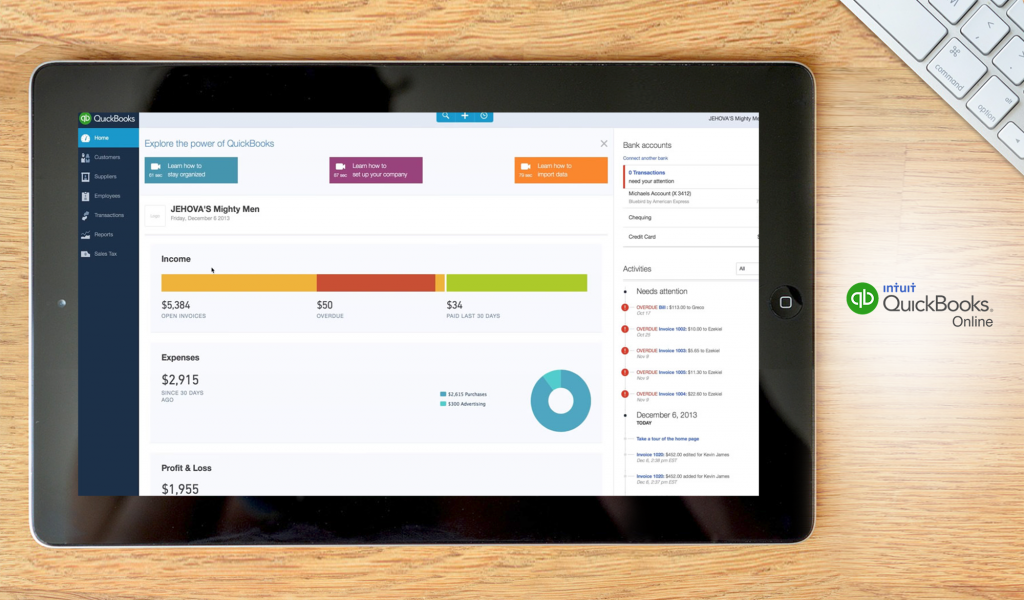
QuickBooks Online is an accounting solution from popular software provider Intuit. The product is specially designed for small business operations, including startups and independent accounting firms. Moreover, it is also a popular go-to application for freelance bookkeepers. In fact, the most cost-effective plan from QuickBooks Online is only priced at $5 per month. And, it targets self-employed people.
Of course, the software provider makes more advanced features available. Among the well sought-out QuickBooks Online features include those for managing invoices, tax calculations, balance sheet reporting, payment tracking, and bills. Also, the platform has secure and reliable automations for online banking, workflows, and report generation.
The solution is also made available via its native applications for both iOS and Android devices. Furthermore, it works well with other applications, thanks to its built-in integrations. It provides integrations with Mavenlink, Jobber, and Method CRM, among many others. Lastly, pricing starts at an affordable price of $25 per month.
Detailed QuickBooks Online Review
Key Features of QuickBooks Online
- Automatic Tax Calculations
- Dashboard and Feeds
- Payment Tracking
- Bank Data Sync
- Bill Management
- Check Printing
Sage Business Cloud Accounting

Sage Business Cloud Accounting, known previously as Sage One, is as its name suggests—is a cloud-based accounting solution. The product is not only prized for its comprehensive set of features and advanced capabilities but also for its high out-of-the-box usability. It is also scalable and inexpensive. Thus, it is great for small businesses and startups.
Key features include highly-visual dashboards, accountant access, recurring invoices, task management, and advanced analytics tools. And, speaking of analytics, Sage Business Accounting Cloud offers users automatic reporting and reporting customization capabilities, including drill-downs and various visualizations. Thus, users can easily generate actionable insights from data gathered and manipulated using the platform.
Moreover, you can access its features via mobile applications for both Android and iOS devices. Hence, it can be used on the go. Also, it works well with other popular platforms. The list includes PARIM, 9 Spokes, and Practi. Of course, it integrates seamlessly with other Sage products like Sage One Payroll. Thus, you can easily incorporate it into your company’s workflow and digital architecture.
Also, the solution is priced at very affordable rates. Its most basic plan costs $10 per month. And, it already includes useful modules, including features for bank reconciliation, record income, and instant automatic data backup. Hence, it is a good fit for small business operations.
Detailed Sage Business Cloud Accounting Review
Key Features of Sage Business Cloud Accounting
- Accountant Access
- Bank Statement Imports
- Drill Downs
- Dashboards
- Mobile Applications
- Analytics and Reporting
AvidXchange

AvidXchange is another robust accounting tool for small business use. It is available via flexible custom pricing plans; and, it’s deployed according to your particular needs. Thus, you only pay for the modules and capabilities you need. Key features include spend management, purchase order application, and billing services.
It also offers users automation capabilities such as its invoice accelerator and bank reconciliation features. Of course, it provides users with basic accounting tools like a general ledger. Also, the product includes collaboration tools, including a supplier portal.
AvidXchange also integrates seamlessly with other third-party software applications. Its more than 210 integrations include those with Microsoft Dynamics GP, Yardi, Oracle NetSuite, and Rent Manager. Lastly, the platform is available via custom subscription plans, thus small businesses can get a custom quote for the extent of features and functionalities useful to them.
Detailed AvidXchange Review
Key Features of AvidXchange
- General Ledger
- Spend Management
- Billing and Pay Services
- Payment and Invoice Applications
- Cash Management
- Supplier Portal
A2X

A2X is a cloud-based accounting solution for ecommerce companies. It makes direct transactional data available to your accounting platform through its integrations with various sales channels Shopify and Amazon. These help users track transaction data more accurately and in real-time. A2X works seamlessly with popular accounting tools like QuickBooks, Xero, and Sage.
Key features include financial reconciliation, general ledger, inventory accounting, transaction history, multiple currency support, and multiple seller accounts. Moreover, aside from its integrations, it also provides great data export/import functionality.
A2X is also highly scalable and flexible. So, users can customize it according to their needs It is known to be used by operations of all sizes, from freelance sellers to large enterprises. The platform is also offered via tiered plans. Pricing starts at $19 per month and it supports 100 to one million orders.
Detailed A2X Review
Key Features of A2X
- Financial Reconciliation
- General Ledger
- Sales Channels Integrations
- Accounting Systems Integrations
- Cost of Good Sold Functionality
- Inventory Accounting
Rossum

Rossum is a document-based business solution that is great for accounting operations. The platform has the ability to extract key information from documents such as invoices and bills to create tasks and workflows. This is thanks to its advanced cognitive data capture function that leverages self-learning AI technology. The feature allows users to scan, categorize, and validate data and use them as a base for communication and collaboration.
Key features include unified mail channels, a single document gateway, audit trails, data matching, and intelligent document curation. Moreover, the platform is also known for its accurate and highly-visual reporting and analytics tools. Thus, users can generate actionable insights quickly.
The platform has a native application for smart data capture using mobile devices. Also, it integrates seamlessly with ERP software and other business solutions like Zoho Books, Google Drive, Sage Intacct, and NetSuite. As Rossum is deployed according to your business needs, it is only available via custom subscription plans. Hence, small businesses can configure Rossum to fit their particular requirements.
Detailed Rossum Review
Key Features of Rossum
- Intelligent Document Curation
- Unified Mail Channels
- Cognitive Data Capture
- Data Matching
- Usage Reporting Dashboard
- Audit Trails
Trolley

Trolley, previously Payment Rails, is a global payment automation solution. The product helps users simplify payout workflows and mass payments to more than 200 countries and regions worldwide. Moreover, it is also prized for its automated tax compliance feature. This makes filing end-year reports, validating TINs, and completing tax forms for IRS requirements.
Key features include real-time payout monitoring, mass payouts automation, tax reporting, risk mitigation, bank account validation, and customized approval workflows. Moreover, the platform is also very easy to use. This is thanks to its sleek and clean UI design, providing users with a great experience from the get-go.
Furthermore, the platform integrates seamlessly with third-party products. The list includes SendGrid, QuickBooks, Shopify, Salesforce, and Zendesk, among many others. Pricing starts at $49 per month, supporting unlimited numbers of users, recipients, and payments. Thus, it is perfect for small businesses that have to manage payouts to a multitude of suppliers per month.
Detailed Trolley Review
Key Features of Trolley
- Automated Mass Payouts
- Real-Time Payout Monitoring
- One-Platform Reconciliation
- Tax Reporting
- IRS Tax Compliance
- Risk Mitigation
DocuPhase

DocuPhase is a flexible document-based automation solution for organization of any size and type. It provides users with a document-centric workflow that can be deployed in accounting and bookkeeping operations. In fact, it has a comprehensive list of accounting and financial features. These include accounts payable automation, invoice process automation, and approval automation.
The product also runs an advanced optical character recognition (OCR) engine to easily extract data from documents such as receipts and contracts. In this way, users can easily capture, collect, and categorize important documents for bookkeeping and accounting.
Moreover, the platform is also fitted with collaboration tools, complete with a workflow builder with easy drag-and-drop controls. Also, it works seamlessly with other solutions, including Microsoft Dynamics, NetSuite, and QuickBooks. Lastly, it is deployed custom to your business needs. Thus, small businesses can get custom quotes for the features and capabilities that they are looking for.
Detailed DocuPhase Review
Key Features of DocuPhase
- Optical Character Recognition
- Robotic Process Automation
- Workflow Automation
- Invoice Process Automation
- Accounts Payable Automation
- Workflow Customization
PayEm

PayEm is a global procurement and spend management solution rolled into one. It handles end-to-end processes, from request to reconciliation. This is particularly useful to small businesses with global operations in industries such as ecommerce or professional web services.
Key features include digital receipt management, invoice and request capture, real-time reporting, bank integration, expense reporting, AP automation, and, of course, fund transfers. The platform also has great currency conversion capabilities supporting global ecommerce accounting needs.
In addition, PayEm also has modules for budget management and payment scheduling. For now, the platform is known to integrate well with NetSuite. Also, it provides users with a native application to manage and monitor their operations while they are on the go. Lastly, PayEm is deployed according to your requirements. hence it is available via custom quotes.
Detailed PayEm Review
Key Features of PayEm
- Spend Management
- Expense Reporting
- Bank Integration
- AP Automation
- Digital Receipt Management
- Budget Management
Zoho Books

Zoho Books is a comprehensive accounting solution specially designed for growing businesses. Like other products from the software provider, Zoho Books is easy to use, coming with high out-of-the-box usability. It is perfect for companies that want to migrate their accounting process online. This is thanks to its spreadsheet import capabilities.
Its key features include inventory management, contact management, project time tracking, automatic bank feeds, cash flow statements, balance sheets, and online payments management. Moreover, the platform generates exhaustive reports and is fitted with collaboration tools. This includes a collaborative client portal as well. So, it can also be used by accounting firms.
Zoho Books is also highly scalable. Hence, it can adapt to your operation as it grows. Moreover, it has a tax management module. Thus, you can rest assured that you will hit compliance benchmarks. Of course, this should be set up correctly. Furthermore, the product has mobile applications so you can access it on the go.
The product is a part of the Zoho suite of apps and it works perfectly well with other products of the company. It also integrates seamlessly with payment gateways like PayPal and Stripe. And, it works well with third-party solutions like Avalara for tax and Temponia for time tracking. Pricing starts at $20 per organization monthly. Also, it has a free plan available that supports one user and one accountant.
Detailed Zoho Books Review
Key Features of Zoho Books
- Accounting
- Exhaustive Reports
- Invoice Templates
- Inventory Management
- Project Time Tracking
- Tax Management
Zoho Expense
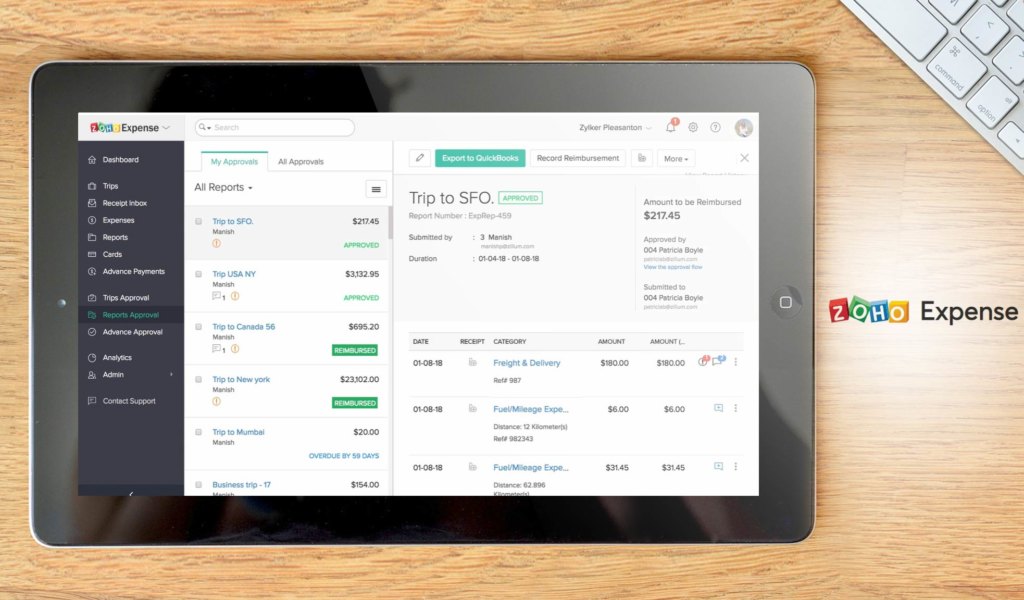
Zoho Expense is an easy-to-use expense tracking and reporting application. It comes with automation tools and workflow customization options. Key features include auto receipts scanning, spending visibility, credit card import, multi-stage workflow, mileage tracking, approval simplification, and expenditure controls.
Of course, the platform integrates with other Zoho products, especially Zoho Books for more advanced accounting and Zoho CR as well. Also, Zoho Expense is highly scalable as well. Hence, it can adapt to your operations as it grows.
Moreover, you can access the solution via its mobile applications for iOS, Android, and Windows devices. It also has a free plan that supports three users, 100 auto scans, and multi-currency transactions. Its Standard plan costs $15 per organization per month.
Detailed Zoho Expense Review
Key Features of Zoho Expense
- Expense Recording Automation
- Auto Scan Receipts
- Spending Visibility
- Mileage Tracking
- Mobile Receipt Upload
- Zoho Books Integration
Xero

Xero is one of the most popular accounting solutions for small businesses. It is widely used among SMEs and freelance professionals like accountants and bookkeepers. This web-based solution is fitted with comprehensive accounting and financial management tools. These include modules for inventory management, financial reporting, expense claims, bank reconciliation, and analytics.
It also has advanced features for payroll management, purchase orders, fixed assets, invoicing, and contacts management. Moreover, it is prized for its tax and compliance tools. These include quick and easy 1099s and GST returns. The platform also provides multi-currency support. Also, it allows users to access it from anywhere, including mobile devices. This is thanks to its easy-to-use native mobile apps.
Moreover, Xero works well with third-party solutions. Thus, you won’t have to leave your digital ecosystem behind just to adopt Xero. Integrations include those for Stripe, Squarespace, Evernote, PayPal, Mogul, and Boomr, among many others. Lastly, Xero pricing packages start at $5.50 per month.
Detailed Xero Review
Key Features of Xero
- Contact Management
- Financial Reporting
- Inventory Management
- Mobile Apps
- Online Accounting
- Purchase Orders
Sage 50cloud

Sage 50cloud is a hybrid online and on-premise platform that is popular among SMEs. It offers comprehensive features for managing cash flow, budgets, inventory, tax compliance, and invoicing. Moreover, it provides users with many add-on options like a module for payroll and credit card processing.
Other key features include an activity dashboard, bank reconciliation, collaboration tools, contact database, batch processing, financial analysis, and supplier management. It also has project management capabilities. Moreover, you can access all these features via its mobile applications for iOS and Android devices.
Also, while being popular among SMEs, the product is also used by large enterprises. This is because the product is highly scalable. This means it adapts to your operations as your business grows. It also integrates with other third-party solutions like BQE Core, Bill.com, and Microsoft software tools. Pricing starts at $50.58 per month.
Detailed Sage 50cloud Accounts Review
Key Features of Sage 50cloud
- Financial Management
- Tax Compliance
- Bank Reconciliation
- Financial Analysis
- Electronic Payments
- Project Management
FreeAgent
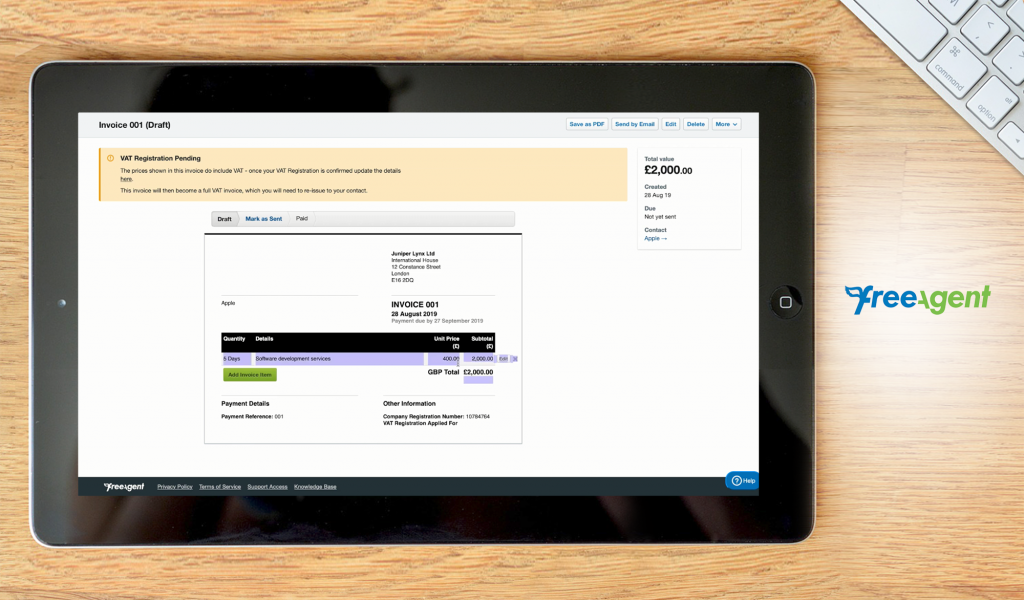
FreeAgent is an online accounting solution targeted at small businesses and freelancers. It provides them with comprehensive tools that are not only easy to use but also have advanced functionalities. These include invoice templates, tax compliance, sales tax reports, accountant access, invoice templates, time tracking, and expense management.
Moreover, the product is customizable. In fact, you can customize your workflows, invoices, and reports. It also integrates well with other business tools such as PayPal, Float, Basecamp, and Zapier, among a host of others. Moreover, you can access FreeAgent via its native application for Android users.
Also, FreeAgent offers a free trial. Hence, you can check its features and UI out for yourself without any financial commitment. Pricing is also small-business-friendly at $10 per month for your first six months with 30 days free. After the period ends, the price will be at a still affordable rate of $20 per month.
Detailed FreeAgent Review
Key Features of FreeAgent
- Estimates and Proposals
- Timesheet Reporting
- Sales Tax
- Tax Timeline
- Expense Management
- Multi-Currency Invoicing
Which tools work for you?
For a general accounting platform solution that takes small business needs as its priority, you’ll do well with FreshBooks. There’s a good reason it places first in this list of the best accounting tools for small business. It provides users with easy-to-use features that are more than enough for small business accounting needs. Moreover, the product is affordably priced considering the number of features and the level of capabilities it provides. Also, it includes other useful modules for small businesses like project overviews and collaboration tools. Hence, FreshBooks should be on your shortlist. Or, better yet, it should belong at the top of it.
Of course, there are other platforms listed that you could use together with a general accounting software solution like FreshBooks. For instance, if you run a small ecommerce operation, then A2X can help you integrate sales channels with it. Moreover, if you already have a document-based workflow, then stacking FreshBooks with Rossum or DocuPhase makes a lot of sense. Oftentimes, it is useful to have a software stack that covers more ground. However, FreshBooks should be enough for most small business operations needs. To be sure, you can always see how it works in your real business setting if you go for its free trial offer.
It is really high time for small businesses to adopt accounting platforms. And, cloud accounting tools seem to be the platforms of choice. In fact, according to accounting software statistics, around 67% of accountants prefer them over on-premise ones. Thus, small businesses should take this cue and consider choosing web-based solutions so they can collaborate better with their accountants. Furthermore, as they can easily be accessed anywhere from any device, small business owners can stay on top of their finances whenever they need to.


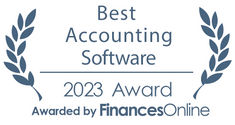
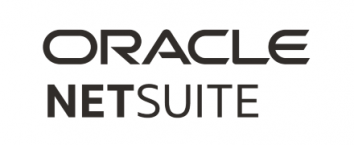













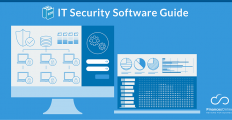













Leave a comment!